By John Y. Brown III, on Thu Aug 1, 2013 at 3:00 PM ET 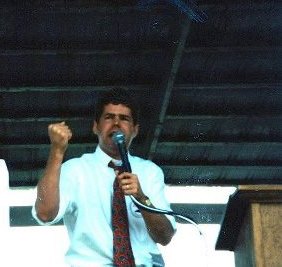 Kentucky has a constitutional oath that requires officeholders to swear they won’t fight in a duel. Yet at the same time Kentucky has the political crucible of Fancy Farm that requires candidates seeking statewide… and congressional office are required to endure each August —which at times has seemed less inviting than a duel with guns (and a few times less dangerous, too.). Kentucky has a constitutional oath that requires officeholders to swear they won’t fight in a duel. Yet at the same time Kentucky has the political crucible of Fancy Farm that requires candidates seeking statewide… and congressional office are required to endure each August —which at times has seemed less inviting than a duel with guns (and a few times less dangerous, too.).
It’s not bullets you fear but jeers and cheers (for your opponent) and the momentary mental lapse of twist of tongue that could be the gaffe that everyone talks about the next day. You fear humiliation on the most prized of our state’s political stages, the platform for political speeches at Fancy Farm.
Fancy farm is an amalgam of history and entertainment. Part historic and revered much like the old Chautauqua assembly and yet also part “trial by ordeal” much like the carnival game of baseball toss to cause the seated person to fall into the dunking tank. As a speaker at Fancy Farm you strive to be remembered as falling into the former category rather than into the metaphorical dunking tank. And if you succeed, you are the exception to the rule.
At 32 I was the Democratic Party’s nominee for secretary of state and slated to speak at the vaunted Fancy Farm picnic. The picnic is on a Saturday and I was staying in Paducah, Kentucky the entire week before leading up to Fancy Farm to campaign in the Western Kentucky region and prepare mentally for the big day. As the big day approached, the more nervous I got. Thursday I was barely able to eat. To make matters worse, it was my anniversary and, yes, I somehow blanked out and forgot. And didn’t remember before my wife reminded me. She had not forgotten. Fortunately, with the help of some wonderful local friends we found a romantic restaurant in Paducah to spend our 4th anniversary together. And after that romantic dinner, and the gift of a kitchen table my wife had been lobbying me to buy us for several months, and the passing of another 18 years of marriage, I almost feel like that incident is behind me now. Almost.
The next day was the other big annual event that weekend: The Democratic Party’s Bean Supper in Marshall County. It was my first visit to Marshall County since the primary and I got off to a rocky start after I announced to the large audience that it was “Great to be back in McCracken County again.” After the speech the chair of the Democratic Party, Terry McBrayer, whispered to me that I was actually in Marshall County. I asked Terry if I should get back on stage and correct myself and maybe explain it was confusing with both counties starting with the letter “M” but he suggested I just let it lie and work on getting it right next year. That was wise advice.
I also learned after my less than dazzling speech that swung for the fences and at best turned out to be a broken bat single (or arguably a forced walk) that sometimes less is more from the speaking stump. I spoke after attorney general candidate and current state auditor Ben Chandler. Ben gave a familiar and non-controversial speech that was well received, as always. I was all over the place with my speech trying to stand out. Trying to quote Shakespeare and comparing Larry Forgy to Hamlet. Afterward as we listened to others give their speech I asked Ben how I did. He smiled in the way a mentoring friend would if he were wanting to say to you, “Well, you didn’t humiliate yourself. But you came darn close a few times.” Of course, Ben was too much of a gentleman to say that and instead whispered to me, “You know, it’s not always the best strategy to try to give the most memorable speech at Fancy Farm.”
Read the rest of…
John Y. Brown, III: Fancy Farm Memories
By Rod Jetton, on Thu Aug 1, 2013 at 1:30 PM ET From KSGF 104.1, Springfield, Missouri:
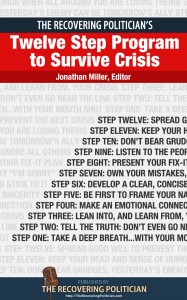 Click here to order
Guest: Rod Jetton- The Recovering Politician’s Twelve Step Program to Survive Crisis
Who is Rod Jetton and what was his involvement in Missouri politics? What is the theme that comes through this book that is written by 12 different authors? Where did he make his biggest mistake while in office and what is his chapter about? What is human nature when you are caught? What is his advice for those entering politics? What is the average person’s misconception about politicians?
Click here for the podcast.
By John Y. Brown III, on Thu Aug 1, 2013 at 12:00 PM ET
Redefining being “overweight.”
When I was in college I had a “reducible hernia” in my lower left abdomen. I had a small protrusion that could be “pushed back in,” hence “reducible.” I would push it back in until I finally got the problem properly diagnosed and repaired. And I haven’t seemed to have a problem with it ever since.
Until this afternoon when I felt my stomach before playing basketball and my stomach is, well, I guess you could say it sort of protrudes. The main problem, however, is that it isn’t “reducible.” I can’t push it back in like I used to be able to do with the hernia in my youth.
This may just be a product of getting older or it may be a more dramatic tear….or something.
I can’t tell if I’m not pushing in the right place, or not pushing at the correct angle or perhaps not pushing hard enough. Whatever I do my stomach stays, more or less, slightly protruded and doesn’t appear to have anything it’s poking out of to be pushed back into.
 But how is it my fault that I haven’t figured out yet how to put it–my stomach– back into its proper place. Until someone tells me otherwise, I’ve decided to conclude that I’m not really overweight but merely have a “temporarily irreducible and slightly herniated stomach” in my lower and upper abdomen on both sides.” But how is it my fault that I haven’t figured out yet how to put it–my stomach– back into its proper place. Until someone tells me otherwise, I’ve decided to conclude that I’m not really overweight but merely have a “temporarily irreducible and slightly herniated stomach” in my lower and upper abdomen on both sides.”
All I know is that this is a medical condition that isn’t a reflection of my lack of will power or discipline. And it’s probably just a minor flair up from my hernia repair 28 years ago. These repairs can’t last forever. This one is just a little more pronounced.
That’s my story and I’m sticking to it.
Oh, and don’t you dare ask me in my current medical condition to lift any heavy objects. I do remember that’s the last thing you ask someone with a small hernia (or even medium sized hernia–or larger) is to do heavy lifting —at least until they are fully recovered. ; )
By Artur Davis, on Thu Aug 1, 2013 at 10:00 AM ET Having had the ill-timing of criticizing Barack Obama’s limited reactions to the Zimmerman trial at precisely the moment he was making extended comments on the subject, I’ll add a few updated thoughts, some tough on Obama, some equally tough on conservatives.
First, I read Obama’s 16 minutes on race not so much historically (the Jeremiah Wright speech was substantially more decisive to his career, and the entirely peaceful, mostly civil furor over the verdict does not begin to compare to the drama around either Lyndon Johnson’s “We shall overcome” epic a few days after Selma, or John Kennedy’s masterpiece the night after George Wallace stood in the schoolhouse door) but as a pretty fair brief for what he does and does not bring to the national debate. When engaged, the president ratifies the convictions of his admirers and the roughly half of the country that sees the world as he does compellingly, more so than any public figure not named Bill Clinton. Given that successful politicians need to keep their base inspired, that’s no small thing.
But what Obama has been perpetually unable to do is to break down the resistance of Americans who don’t share his worldview. He has, in fact, no history of shifting public opinion on any single cause he adopts: from health care, to immigration reform, to expanded gun background checks, to tougher climate change regulations. Obama’s defenders aren’t off-base in their insistence that he has the misfortune of presiding during a hyper-partisan time, but that excuse seems to conveniently wish away Obama’s 2008 rationale that he was singularly equipped to reverse that same polarization.
So, the responses to even Obama’s best speeches disconcertingly resemble the old split screens after the OJ Simpson acquittal a generation ago: rapture on one side, stone cold indifference or hostility on the other. It does not help that from a hard tactical perspective, Obama has not been adept at the Clintonian maneuver of telling tough truths to his base that build credibility across the divide. Instead, he has taken the easy route of addressing black on black crime in the context of gun availability but rarely through the larger prism of young men devaluing their neighbors and themselves to the point of making violence routine. He has infrequently, at least since his 2008 Philadelphia speech on race, evoked the mutual recriminations between blacks and whites that are so pervasive that they have degraded casual language and can ever so often still produce fatal outcomes. For instance, I’m in the camp that thinks something like this circle of shared hostility is really the proximate cause in Sanford, Florida that turned suspicious looks into words, and that segued into a confrontation that ended in death.
 But whatever Obama’s inadequacies as a national persuader, conservatives are wrong to dismiss Obama’s talk as just so much “divisiveness” or “race-baiting”, to pick out a few choice adjectives. It’s a revealing error of judgment, though: to see Obama’s observations about the persistence of racial indignities as something unduly provocative is to purchase a myth much too common on the political right—that racial limitations are nothing more than a proxy for something else, perhaps class or educational differences, and that stressing over discrimination is just a liberal wedge tactic. While, as Gallup just documents, well below a majority of blacks describe bias as the most significant obstacle they face, the number who genuinely believe race has vanished altogether as an impediment is infinitesimal, well below the roughly 900,000 or so African Americans who voted for Mitt Romney. The evidence against too pollyannish a thesis on race is sweeping, from surveys documenting the large numbers of whites who harbor stunningly stereotypical views of blacks on subjects ranging from intelligence to work ethic, to the rickety foundations black owned businesses enjoy even when they are propped up with government loans, to astonishingly low numbers of blacks on some of the most prestigious fast tracks in America (elite law firm partnerships, Wall St brokerage firms, senior leadership at Fortune 500 firms to signal out a few). But whatever Obama’s inadequacies as a national persuader, conservatives are wrong to dismiss Obama’s talk as just so much “divisiveness” or “race-baiting”, to pick out a few choice adjectives. It’s a revealing error of judgment, though: to see Obama’s observations about the persistence of racial indignities as something unduly provocative is to purchase a myth much too common on the political right—that racial limitations are nothing more than a proxy for something else, perhaps class or educational differences, and that stressing over discrimination is just a liberal wedge tactic. While, as Gallup just documents, well below a majority of blacks describe bias as the most significant obstacle they face, the number who genuinely believe race has vanished altogether as an impediment is infinitesimal, well below the roughly 900,000 or so African Americans who voted for Mitt Romney. The evidence against too pollyannish a thesis on race is sweeping, from surveys documenting the large numbers of whites who harbor stunningly stereotypical views of blacks on subjects ranging from intelligence to work ethic, to the rickety foundations black owned businesses enjoy even when they are propped up with government loans, to astonishingly low numbers of blacks on some of the most prestigious fast tracks in America (elite law firm partnerships, Wall St brokerage firms, senior leadership at Fortune 500 firms to signal out a few).
The right’s tendency to embrace too sanguine a view of race, and to brush off consternation over profiling and stop and frisk as the lament of professional activists, may actually be the single most intractable reason why Republicans fall flat with parts of the black population who are affluent enough that their security doesn’t depend on Obamacare, welfare, food stamps or some other element of the safety net. And the fact that a good chunk of the conservative base is resistant to the notion that there are institutional barriers that flow from those cultural suspicions of blacks has opened a blind spot: precious few on the political right are willing to update their vision to contain reforms that might alleviate some of those burdens, or to acknowledge the reductions of those burdens as a price of restoring a freer market and a more cohesive culture.
Read the rest of…
Artur Davis: What Conservatives Need To Take From Obama’s Race Speech
By John Y. Brown III, on Wed Jul 31, 2013 at 12:00 PM ET 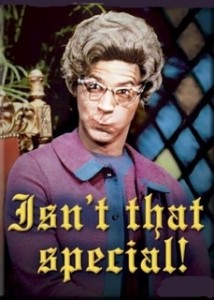 How to be special. And be able to prove it. How to be special. And be able to prove it.
I just realized, according to a popular idiom, that are very few individuals out there who can be considered special.
How did I come to this inevitable conclusion?
Yesterday I used the phrase in describing two well known public figures I had met many years ago in my childhood as two men who, “Put their pants on one leg at a time just like the rest of us.” Therefore, my friend and I agreed that since that was the case, it was surely true that these two public personalities were “just like us” in all the important ways. That they were just normal and ordinary, after all.
But that got me to thinking, “Does that mean that everyone—every single person—who puts their pants on one leg at a time is basically an ordinary person?” I mean, that’s the whole point of the phrase, right? “He (or she) puts his (or her) pants on one leg at a time.” Ergo, they aren’t special. It’s the great equalizer. Pants putting on, that is.
In other words, anyone who puts their pants on one leg at a time instantly moves from the category of “special” (if they possess some rare talent or skill) to the category of “ordinary.”
 So, how to we find truly special people? It means we should really ask–for the sake of efficiency —who DOES NOT put their pants on one leg at a time. Since that is a small group, presumably, we will quickly limit all the possible candidates for being a special person. Once we have this tiny group of people who, for whatever reason, pass the “ordinariness” threshold test by putting their pant on in some way other than one leg at a time, we are ready for the critical next step. So, how to we find truly special people? It means we should really ask–for the sake of efficiency —who DOES NOT put their pants on one leg at a time. Since that is a small group, presumably, we will quickly limit all the possible candidates for being a special person. Once we have this tiny group of people who, for whatever reason, pass the “ordinariness” threshold test by putting their pant on in some way other than one leg at a time, we are ready for the critical next step.
Of these individuals in the “non-one leg at a time pants putting on routine when getting dressed,” which ones also have some rare talent or gift? Once we identify those individuals–given we have eliminated the great equalizer test in the pants department, we will, technically speaking, have a list of the only truly “special” people in this world. Just like that!
Isn’t logic a a wonderful tool enabling us to reach correct conclusions?! It sure is!
Oh by the way, I’m trying to teach myself to put my pants on over my head like a pull over shirt. It’s slow-going so far… but I am determined. To be special, that is.
By Jason Atkinson, on Wed Jul 31, 2013 at 8:30 AM ET
By John Y. Brown III, on Tue Jul 30, 2013 at 12:00 PM ET  Imagine Paris (“That’s hot”) Hilton commenting, “That’s so luke warm.” Imagine Paris (“That’s hot”) Hilton commenting, “That’s so luke warm.”
A middle-aged friend finalized his divorce recently and I tried my hand, feebly, at matchmaking.
In describing him to a divorcee woman I work with I tried to buikd him up to her.
She asked half-jokingly with a smirk, “So, is he hot?”
 That caught me off guard and I recovered with this failed response. That caught me off guard and I recovered with this failed response.
“I wouldn’t say hot in the conventional sense of the word.. but a more middle aged kinda hot. Like something that you made to eat two days ago that gets heated up and you are pleasantly surpried to find it is still edible. Sooo, kind of hot but in the warmed-over sense. Which can be good. Like pizza.”
By Artur Davis, on Tue Jul 30, 2013 at 10:00 AM ET Count me as being in the camp that thinks the press’s fixation on Anthony Weiner’s sexual misdeeds was not worthy of the live cable deathwatch before his latest confessional press conference: in fact, it was the raw equivalent of inadvertently wandering into a pornographic chat-room and the browser breaking down. That’s not to excuse the most brazen or lurid elements of Weiner’s actions, or to venture into the parlor game over what Weiner’s conduct, particularly if it persisted after the implosion of his career, says about his judgment or some other cryptic zone within his psyche.
But I’ll hold onto a broader point that I made over a year ago in the context of a set of similarly unbecoming revelations about a figure decidedly more consequential than Weiner: the late John F. Kennedy, who—if we believe an woman who stayed silent for almost 50 years until a book deal incentivized her—gave Weiner a run for his money in promiscous crudity and unlike Weiner, poached on his own official staff and even shared his spoils with another member of his entourage. My argument, then and now, is that given a choice between trying to extrapolate character from sordid private conduct that gets unmasked and the readily available public record, I’ll take the latter, because it almost always gives off fewer false positives and tells us infinitely more about just how a particular personality would use or misuse power.
In the context of JFK, his public courage on civil rights and forging a détente with the old Soviet Union struck me as more dispositive of what and who he was than the considerable evidence that his presidency would not have survived if the door had come off the hinges of his private life. The opposite is just as true for, oh, several thousand public figures whose private pristineness has never much interfered with their pursuit of enrichment at the public’s expense, or their trading of reelection for the price of failing to lead, or their mediocrity in wasting a role of responsibility out of laziness or disinterest.
Weiner is obviously no Kennedy, and but for highlighting the wrong handle and sending a dirty tweet to the wrong twenty-something, would have stayed stuck in obscurity. Therefore, he is like those thousand or so other mortal politicos who don’t require a deep character dive to understand. In fact, the public profile of the former congressman tells any discerning observer plenty: therein lies the thin record of a legislator of genuine intelligence who still managed to avoid shaping any major bill in the decade or so he spent in the House; who routinely subordinated his hearings and floor time to his cable appearances; and whose penchant for verbally abusing staffers and changing staff leadership was noteworthy even in an environment where petty, whim-driven browbeaters are a dime a dozen.
 If Weiner’s “narcissism”, the sin people with keystrokes keep assigning to him, is the fault that legitimizes the dig into his personal misdeeds, there is just as probative an exhibit in the first couple of months of his candidacy for Mayor: the Sunday Times profile that sounded weirdly but exactly like an ex athlete touting how easy it is to get free stuff, and bragging about the sale price of his jersey. And on a routine day, his stump speeches and debate performances have resembled more a mash-up of his extemporaneous speeches on the House floor than any deeply thought out platform for the world’s greatest city. He seems, for example, under the spell that a city that, if it had to keep books like a company would be insolvent, could sustain its own publicly run health insurance program: that, more than his sex talk, is what unmasks him as a fantasist. If Weiner’s “narcissism”, the sin people with keystrokes keep assigning to him, is the fault that legitimizes the dig into his personal misdeeds, there is just as probative an exhibit in the first couple of months of his candidacy for Mayor: the Sunday Times profile that sounded weirdly but exactly like an ex athlete touting how easy it is to get free stuff, and bragging about the sale price of his jersey. And on a routine day, his stump speeches and debate performances have resembled more a mash-up of his extemporaneous speeches on the House floor than any deeply thought out platform for the world’s greatest city. He seems, for example, under the spell that a city that, if it had to keep books like a company would be insolvent, could sustain its own publicly run health insurance program: that, more than his sex talk, is what unmasks him as a fantasist.
I might cut the press voyeurism some slack, and might even justify the elevation to mainstream discourse of a website whose disclaimer mentions that it does not get in the weeds of discriminating between the true and the untrue (I avoid a link in the interest of not abetting their traffic) if dirty messages were actually necessary to unearth the real Anthony Weiner. But they aren’t. And that’s no ad hominem kick on a guy I admit I liked when I served with him: no, it’s instead a sober reflection about going into dark places on the flimsy excuse of finding light.
By John Y. Brown III, on Mon Jul 29, 2013 at 3:00 PM ET Incredible!
Just got to view a graph of my book sales during its first week.
All I can say is that if this were a roller coaster instead of a book sales chart, it would be epic! Everyone would want to try it!
In one week the book rocke…ted (downward) from the top 11,000 books selling on Amazon.com to the top 396,865. That is about a 4000% drop. Which is something few authors can claim. And have hard data to back it up. I claim it and have the data and am sharing it now.
There are a total of 8 million books on Amazon.com. So, in theory, being ranked 496,865th isn’t as bad as it sounds.
Except that it is.
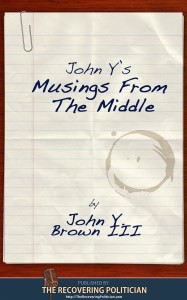 Click here to purchase It sounds so …..um, what’s the word?….Sounds so far behind everyone else. I guess that’s what I’m saying. I mean…have you ever had to pass up 385,000 of anything to get back to where you started? At what point do you look at that blur of 385,000 somethings and say to yourself, “You know what? I’ll try to pass some. Maybe 20 or 25. But the other 384,975 or 384,980 can have it.” I think I’m about to reach that point.
Another option that I am going to suggest to Amazon.com is to re-frame how they describe rankings in my sales territory. Tomorrow I’ll probably hit, say, rank 511,150th. I’m not going to tell anyone about that when it happens. 396,865th is bad enough. But I might be tempted to brag about it if Amazon.com described the ranking instead as “You are now ranked in the bottom 7.5 million in book sales listed on Amazon.com” Something about being in the bottom 7.5 million makes a bigger statement, makes me feel part of something bigger, and doesn’t sound so darn lonely as 396,865.
By John Y. Brown III, on Mon Jul 29, 2013 at 12:00 PM ET 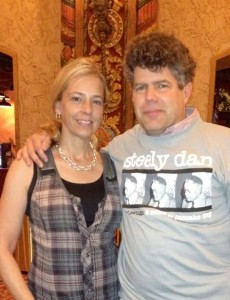 The Dan and their fans do The ‘Ville! The Dan and their fans do The ‘Ville!
The moment of truth was when Donald Fagen strode onto stage. It was more of a cautious shuffle than a swaggering stride, but it was “him.” Sunglasses and all—and it was a hip-looking cautious shuffle. And it was on!
Steely Dan was and is the smartest smoothest jazz rock pop band of my generation. At first sight Donald Fagen could have been confused for theowner of beachfront condo rental properties in South Florida about to address an audience. And we in the audience could have been confused for an AARP gathering to discuss time-share investment opportunities. We in the audience weren’t dressed to impress each other. But dressed with an understated hipness that included a tacit agreement that “I’ll pretend you look as hip, if you pretend I look hip.” But none of us were there primarily for a social event. We were there for the music.
And the music began. Instantly Donald Fagen seemed to morph from middling condo realtor into a bleached out Caucasian version of Ray Charles. And with whom, like Ray Charles, it is clear from the first note that the audience is in the presence of a musical maestro —who can do things musically (almost as an afterthought) that others would never even imagine attempting.
The concert opened with a middling performance of Green Earing but was followed with the epic Aja—which set the tone for the rest of the evening. The young drummer wasn’t Steve Gadd….but had moments that were Gadd-esque and by the close of Aja the audience had tapped into their inner Steely Dan.
Walter Becker reminisced with the audience during Hey Nineteen about a night involving Cuervo Gold and made us all feel like we had attended the same high school as he reminded us, “You all remember what it is was like. You know what it’s like now. And that is that and will always be that way.” We were peers more than fans.
Donald Fagen introduced “King of the World” from the album Coundown to Ecstasy saying it is a “new song for the band” that they hadn’t played since the 70’s and was “from a different life.” Adding to the audience, “You all can relate to that, right?” Although King of the World started clumsily The Dan found their bearings and finished elegantly. It was an inspired and inspirational moment. In addition to reveling in the music the audience was reminded that sometimes we, too, are still capably of conjuring up our creative energies and elegantly reprising something we did in the 70’s –and doing it almost as well as we did back then.
The audience began to bond with each other as we remembered that one of the things we liked about being Dan fans is that it made us feel a little superior to everyone else. Steely Dan is known for their smarty pants lyrics that take the listener to places other bands have never heard of (or if they have heard of it, wouldn’t know that it’s a chic place to go). We secretly suspect that our Dan audiences have a higher percentage of MENSA members than most other concerts. A few in the audience stood and tried dancing the entire concert, which also reminded us that Steely Dan fans weren’t always the coolest kids in high school—just the ones with the best taste in music. It’s hard to dance to Steely Dan anyway. They were always more about the music than the concert experience. In fact, for yeas they refused to even play concerts preferring instead to create flawless sounds from the studio with some of the best back-up musicians in the industry.
The highlight of the night was Bodhisattva about midway through the concert. They brought down the house with a riveting rendition of the band’s most rockin’ song. Which is fitting. A Bodhisattva, after all, is an Eastern religion enlightened being who compassionately refrains from entering Nirvana in order to save others. I think Steely Dan serves that role musically in their own Western way. And we are the beneficiaries.
As the band played on our reaction as an audience reminded me less of a typical frenzied and interactive rock concert audience and more like an audience that simultaneously followed Timothy Leary’s admonition to “Turn on, tune in, drop out.” That’s what Dan fans tend to do. When they turn on their music anyway. We behave well in concerts. Many in the audience may have had a cool buzz but no one passed out. Although nearing the end of the concert a handful of us had nodded off since it was well past our bedtime. More of a personal intermission power nap than falling asleep. We wanted to be alert for the encore.
And we weren’t disappointed when they chose to cue up Kid Charlemagne for the finale. At least that was the last song I heard. We left a little early to beat the crowd. Sure, we Dan fans love our music but we are also practical and a little self-absorbed, too, and hate being stuck in traffic.
As the Palace doors opened into the streets we talked freely to one another like we were in the same high school but just hadn’t spoken before. We all seemed to leave a little happier than we arrived. And feeling a little better about ourselves and the world we live in—and the world we lived in when we first discovered our band.
Earlier in the evening Walter Becker spoke to us not as a faceless audience but as casual peers as if we were at the house of a mutual friend and we were all just standing around downstairs listening to him and his friend Donald Fagen play the party. He reminded us that back in the day we were good. And hadn’t changed all that much. We liked hearing that and even applauded. But more importantly, as we walked back into our individual worlds after this brief escape, the performance had put us back in touch with a part of our best selves. The music helped us remember our better selves—perhaps even remembering ourselves better than we really were.
And we felt for the first time in a long time like maybe we really were that good after all— and, like Steely Dan, could still be again.
|
|
 Kentucky has a constitutional oath that requires officeholders to swear they won’t fight in a duel. Yet at the same time Kentucky has the political crucible of Fancy Farm that requires candidates seeking statewide… and congressional office are required to endure each August —which at times has seemed less inviting than a duel with guns (and a few times less dangerous, too.).
Kentucky has a constitutional oath that requires officeholders to swear they won’t fight in a duel. Yet at the same time Kentucky has the political crucible of Fancy Farm that requires candidates seeking statewide… and congressional office are required to endure each August —which at times has seemed less inviting than a duel with guns (and a few times less dangerous, too.).











